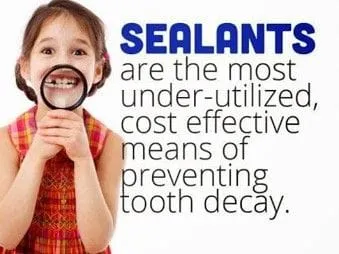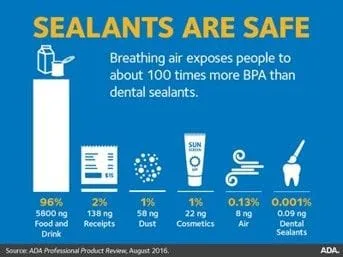S ealants are a great way to protect against tooth decay and cavities on your back teeth (molars) BOTH baby teeth and permanent teeth. These are the teeth that are most vulnerable to cavities and decay because they are used in the chewing process, and are the most difficult to reach and clean. While there is no substitute for brushing and flossing, sealants can keep cavities from forming and may even stop early stages of decay from becoming a full-blown cavity.
In fact, sealants have been shown to reduce the risk of decay by nearly 80% in molars. This is especially important when it comes to your child's dental health. In October 2016, the Centers for Disease Control released a report on the importance of sealants for school-aged children, of which only 43% of children ages 6-11 have. According to the CDC, "school-age children without sealants have almost three times more cavities than children with sealants."

Who Can Get Sealants?
Children and adults can benefit from sealants, but the earlier you get them, the better. Your first molars appear around age 6, and second molars break through around age 12. Sealing these teeth as soon as they come through can keep them cavity-free from the start, which helps save time and money in the long run. Primary teeth are recommended to have sealers when caries risk factors indicate.
How Are Sealants Applied?
To place a sealant an adhesive is first applied to the teeth. The sealant is then placed over the adhesive as a liquid, as if it is painted right onto the tooth. The liquid then hardens and creates a barrier between your tooth and any plaque, food particles, and bacteria.
Can Sealants Be Placed Over Cavities?
Sealants can be used over areas of early decay to prevent further damage to your tooth. Because some sealants are clear, your dentist can keep an eye on the tooth to make sure the sealant is doing its job.
Are There Any Side Effects?
With the exception of an allergy that may exist, there are NO known side effects from sealants.
Is There BPA In Sealants?
Yes, there is a tiny amount of BPA in sealants but not enough to cause you or a loved one any harm. In fact, you get more exposure to BPA by simply touching a receipt, using cosmetics or coming in contact with dust.

How Long Do Sealants Last?
Sealants will often last for several years before they need to be reapplied. During your regular dental visit, your dentist will check the condition of the sealant and can reapply them as needed.
Are Sealants Covered By Dental Plans?
Some plans do cover sealants, so call your dental benefit company to find out what kind of coverage you have.
By taking care of your teeth with daily home care, regular dental checkups, and dental sealants, you can help your children maintain healthy teeth during their growing years, and this puts them on a good oral care path for their future. If you have questions about dental sealants or would like more information contact Rock Valley Dental today.
